Papers by Rochelle Bailey
State of the Pacific 2015, 2015
This In Brief examines the practice of blacklisting in seasonal worker programs such as Australia... more This In Brief examines the practice of blacklisting in seasonal worker programs such as Australia's Seasonal Worker Program (SWP) and New Zealand's Recognised Seasonal Employer scheme (RSE). Blacklisting occurs when workers are permanently or temporarily excluded from programs. It can vary from two to five years, or be indefinite, depending on the offence. The practice of blacklisting is rarely highlighted and should be discussed as there are implications for all stakeholders. This paper raises these issues in the context of ni-Vanuatu in the RSE scheme. The main impetus for this paper is to highlight what happens when workers are blacklisted, some of the reasons behind this, and how growers are affected when perceived problematic workers are not reported to government labour sending units in future seasons.
Social, Cultural and Economic Impacts of Wine in New Zealand., 2014
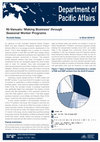
An objective of both Australia’s Seasonal Worker Program (SWP) and New Zealand’s Recognised Seaso... more An objective of both Australia’s Seasonal Worker Program (SWP) and New Zealand’s Recognised Seasonal Employer Scheme (RSE) is to encourage economic development in the Pacific.1 This In Brief highlights how a number of ni-Vanuatu seasonal workers in both RSE and SWP have created various and sometimes unexpected businesses and responded to the changing economic environment in Vanuatu. This research reveals seasonal workers have been encouraged to invest businesses that are not necessarily aligned with what workers want or need. For example, many were encouraged into particular businesses by local chiefs or leaders and did so out of obligation. Workers coming from areas with limited commercial opportunities are dissuaded from potential business aspirations due to concerns their business ideas are not possible to sustain due to limited resources and incomes in their villages. Examining a recent sample (2019) of 79 RSE workers and 95 SWP workers,2 it was found that 87% invested in some t...
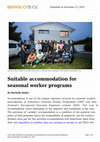
Accommodation is one of the largest expenses incurred by seasonal workers participating in Austra... more Accommodation is one of the largest expenses incurred by seasonal workers participating in Australia’s Seasonal Workers Program (SWP) and New Zealand’s Recognised Seasonal Employer scheme (RSE). The cost of accommodation varies depending on the employer and availability in the area. The provision of ‘suitable’ accommodation is a condition of the pastoral care policy of both programs and is the responsibility of employers, not the workers. Workers must pay for this provided accommodation with deductions taken from their pay regardless of whether they are earning an income or not. There has been public criticism about accommodation for seasonal workers in Australia and New Zealand. Reports have shown that some Pacific workers have been placed in overcrowded and substandard lodgings with inadequate facilities and rates set too high (Bailey 2009:117–18).1 This In Brief looks at some of the challenges as well as changes that have recently occurred in relation to accommodation standards i...
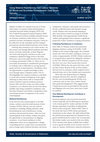
Millions of dollars are remitted each year to Pacific island states via seasonal workers particip... more Millions of dollars are remitted each year to Pacific island states via seasonal workers participating in Australia’s Seasonal Worker Program (SWP) and New Zealand’s Recognised Seasonal Employer (RSE) scheme. Research in labour mobility primarily focuses on monetary remittances taken home to evaluate potential economic development outcomes, which are key objectives for the Australian and New Zealand governments and their bilateral partners in the Pacific. Defining what remittances are is often unclear. Are they money sent through official remittance providers, money sent home informally, or both? Migrants also remit material goods, and there are also social remittances, defined by Peggy Levitt as ‘the ideas, behaviours, and social capital that flow from receiving to sending communities’ (2001:11). These are not necessarily documented or considered by governments or academics due to difficulties in tracing material goods and lack of reporting them. Nonetheless, there are opportunitie...
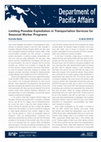
This In Brief highlights the problem of overcharging for transportation of seasonal workers to an... more This In Brief highlights the problem of overcharging for transportation of seasonal workers to and from their worksites in Australia's Seasonal Worker Program (SWP) and New Zealand's Recognised Seasonal Employer scheme (RSE). Unlike accommodation providers and their services to seasonal workers discussed in a previous In Brief, transportation services and costs are rarely addressed. Yet, like other 'wrap around' services 1 (Underhill-Sem and Masters 2017:63) such as accommodation, the costs for transport and the services provided vary. Workers trust providers to charge fair rates for their services, however research has shown that excessive costs for transport have been imposed on workers, and transport providers have been criticised for disproportionate charges (Bedford 2013; Bedford et al 2017; Rockwell 2015). As part of the application to become an approved employer under the SWP or RSE scheme, employers/labour contractors must submit a list of proposed deductions for wrap around services. These deductions are assessed by the government agencies overseeing the seasonal work schemes, yet how the costs associated with these services are deemed to be fair for workers needs further attention. Employer deductions is an area where there is a risk of exploitation, and one that requires ongoing monitoring and oversight. In the author's initial New Zealand (Central Otago) and Australian (Victoria) case studies (2007 to present), employers did not, and still do not, charge a fee for transporting workers to and from work. It was only when workers wished to borrow vehicles for personal use that a charge was applied. Unlike those case studies, it is common practice for employers to make regular deductions from workers' wages for transport. The key question is: 'what is an acceptable charge for transport?' There are employers/labour contractors who, rather than owning their own vehicles, hire vans from third party providers for the duration of their workers' stay. This is an extra cost to be recouped from the workers. More consideration should be given to the idea of employers purchasing vans and charging until the repayments are made, or only charging to
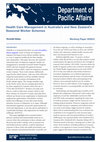
dpa.bellschool.anu.edu.au for labour migrants, as well as findings on Australia’s ‘fly-in fly-out... more dpa.bellschool.anu.edu.au for labour migrants, as well as findings on Australia’s ‘fly-in fly-out’ (FIFO) and ‘drive-in drive-out’ (DIDO) workers who experience similar health concerns and their real and perceived barriers to care. Bedford rightfully states, ‘To protect workers’ welfare while abroad this is an area that requires careful monitoring by the agencies involved in the oversight of seasonal work schemes’ (2013:208). Concerns about the health of migrant workers have existed for decades and the World Health Organization’s recent work (WHO 2013) in this area indicates that further attention is warranted. Regulations set in bilateral agreements between governments and the terms of various health insurance policies held by those participating in the schemes cover potential medical care for workers. However, there are still cultural, social, language and economic barriers to accessing health care that need to be overcome. Methodology and data gathering on health can be limited a...

Asian Development Review, 2021
The Pacific islands have weak economic growth and limited structural change compared to the rest ... more The Pacific islands have weak economic growth and limited structural change compared to the rest of developing Asia. Remoteness and low economic density are two causes. To mitigate these constraints, bilateral arrangements with Australia and New Zealand let Pacific workers seasonally migrate to access higher-paying, more dynamic labor markets. Managed circular schemes are designed to benefit employers in labor-intensive sectors like horticulture, Pacific workers with limited employment opportunities in their own countries, and the communities providing workers. Several studies show large, positive impacts, but more general development impacts have been harder to find. Likewise, clear quantitative evidence of positive impacts in host countries has been hard to obtain. In this paper, we review the main seasonal labor mobility schemes in the Pacific and provide new evidence on community-level and aggregate impacts.
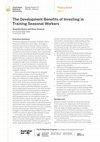
Pacific Research Program An Initiative of the Australian Aid Program Executive Summary The stated... more Pacific Research Program An Initiative of the Australian Aid Program Executive Summary The stated objectives of Australia’s Seasonal Worker Programme (SWP) are to fulfil labour shortages in Australian agricultural industries and to contribute to development in Pacific island countries and TimorLeste. Since the introduction of the SWP there has been a tendency by the majority of government stakeholders to focus on the development benefits possible through financial remittances made by individual workers. Greater attention is required to other ways that the SWP could contribute to development objectives, including through social remittances. One way to capitalise on social remittances is to provide more opportunities for upskilling workers while they are in receiving countries, beyond the limited frame of jobreadiness1 training. When seasonal worker programs are designed with development goals in mind, this allows for focusing on workers as whole people, with potential, skills and con...
This In Brief uses evidence-based research from New Zealand examining pastoral care. It highlight... more This In Brief uses evidence-based research from New Zealand examining pastoral care. It highlights policy expectations and experiences for employers and employees, which affect uptake in seasonal worker programs; consequences on productivity and decisions for future participation.
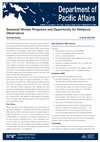
This In Brief discusses an often overlooked aspect of Australia's Seasonal Workers Programme (SWP... more This In Brief discusses an often overlooked aspect of Australia's Seasonal Workers Programme (SWP) and New Zealand's Recognised Seasonal Employer scheme (RSE): opportunities for workers to have religious observances. Religion is important for people in the Pacific and given that the Pacific region is targeted for these schemes, this should not be understated. I highlight the relevance of this issue in terms of policy and how employers and workers are affected, recommending that there is room for further understanding and acknowledgement. Based on evidence from conversations with workers and employers, this paper reveals that this part of the pastoral care policy is not necessarily upheld and, furthermore, people of certain religions face discrimination based on the day of the week on which their observances fall. After discussions with workers it was clear that they did not know about their rights to religious observance. For example, a group of women from Tonga working in NSW said that they were not allowed to take time off for church on Sundays and ni-Vanuatu workers expressed their sadness and guilt because of breaking their sabbaths while participating in these labour schemes. Workers acknowledge it is often difficult to access their denominated churches due to work hours, location, transportation and general understanding and negotiations. This paper also discusses ways in which workers have overcome these barriers.
On 30 June 2017, the State, Society and Governance in Melanesia program (now Department of Pacifi... more On 30 June 2017, the State, Society and Governance in Melanesia program (now Department of Pacific Affairs) at the Australian National University hosted the Team Leaders' Workshop in Port Vila for ni-Vanuatu participating in Australia's Seasonal Worker Programme (SWP) and New Zealand's Recognised Seasonal Employer Scheme (RSE). This was the first time that team leaders from both programs,1 agents, employers, the Vanuatu Employment Service Unit (ESU), and representatives from the Australian and New Zealand High Commissions had come together for this purpose. The workshop provided an opportunity for the various groups to understand the opportunities, challenges, and expectations of team leaders, and for leaders themselves to share their experiences. It also explored support and training options for existing and future team leaders.
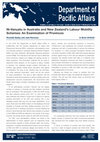
This In Brief discusses the demographic study undertaken in July 2018 by Department of Pacific Af... more This In Brief discusses the demographic study undertaken in July 2018 by Department of Pacific Affairs (DPA), in collaboration with the Vanuatu Department of Labour and Employment Services (ESU). The study focuses on ni-Vanuatu workers in Australia's Seasonal Worker Program (SWP) and New Zealand's Recognised Seasonal Employer scheme (RSE). The rationale for the exercise was to determine which provinces, islands and villages are gaining access to these programs. The information collected will be used to determine future research on the impacts of labour mobility in Vanuatu. The database sample contains information on workers' age, gender, marital status, education, their agents or employers, the type of job, whether they are returnees, and other personal information, which will be the source for future publications. This type of data collection has the potential to assist future decisions on labour mobility policy and development outcome assessments. The authors recommend...




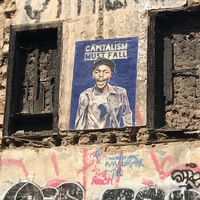






Uploads
Papers by Rochelle Bailey